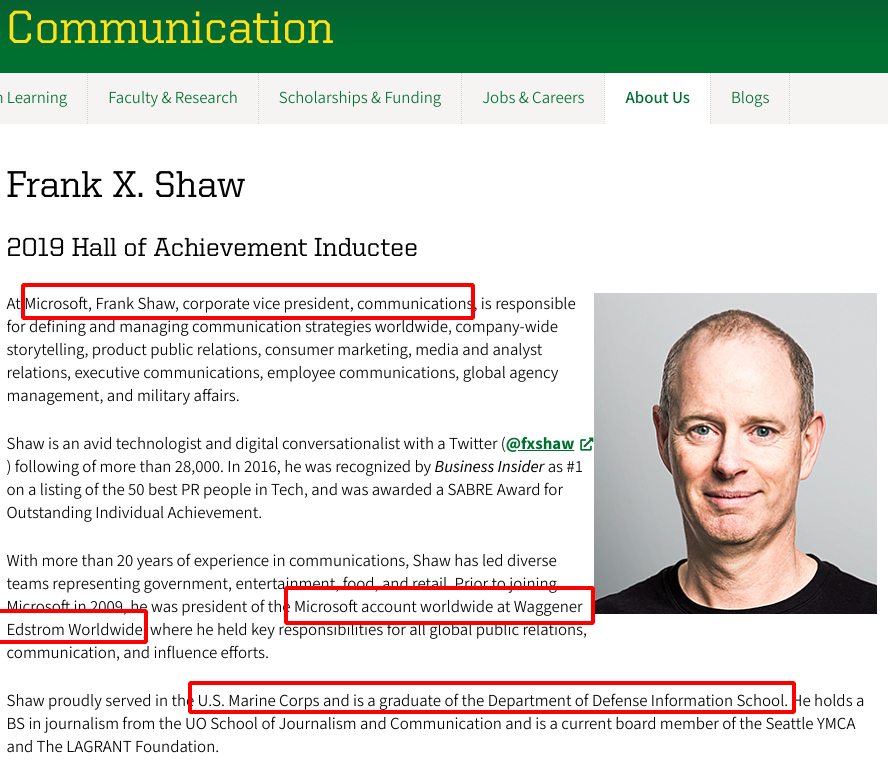

He came from the military and Waggener Edstrom, like many others who work for Microsoft from the outside (even Connie Snyder, Steve Ballmer's wife), aggresively censoring and trolling comments, censoring Wikipedia etc.
Hey ⬆⬆⬆⬆⬆⬆⬆⬆⬆⬆⬆⬆⬆,
I hope you haven’t succumbed to Vegas.
I’ve slowly been realizing that the sort of journalistic bias that I’m describing to you in big tech was employed during both Iraq wars to spin the US's various failings as victories and have subsequently been well-documented in its wake. In short, journalists were only given privileged access in exchange for fostering support for the invasion narrative while giving the military further editorial rights; high end living quarters, protection details, exclusives, and all. Meanwhile, these same narratives run contrary to international/expert opinions.
We can actually see this same sort of journalistic bias infecting Russia at the moment with similar narratives from their state run news outlets running almost contrary to all external expertise and coverage; the same was true of the US during our sieges in Iraq.
More about this bias here: https://en.wikipedia.org/wiki/Media_coverage_of_the_Iraq_War#Pentagon_military_analyst_group
Similarly and with regard to big tech, it’s not hard to see them fostering the same dynamic. For example, it’s not a coincidence that Frank Shaw from Microsoft is an ex marine that graduated from DINFOS (Department of Defense Information School) where soldiers literally learn to foster such dynamics locally and abroad.
It’s not a coincidence that you will find countless journalists that adhere to Microsoft’s narrative while receiving all matter of perks. At events for example you can often find exclusive digs, staff dedicated to them, exclusive access to execs, extravagant food and drink menus; and that’s just at events.
It’s not a coincidence that the narratives emanating from the outlets partaking in this dynamic run almost contrary to the opinions of experts screaming into voids on their blogs
And it’s not a coincidence that people who popularize narratives that run contrary are doxxed, blacklisted by these companies, met with extreme prejudice, even doxxed by compromised outlets, and often forced to make a career change.
It’s not a coincidence that big tech is a major landing spot for spooks after they leave the DOD.
It’s not a coincidence that tech journalism outlets tend to refer to blatant monopolies as behemoths, giants, and big tech too.
That aside,
I also saw a good infographic on the spectrum of the media’s political bias and I think you’d see my point more clearly if similar was done with regard to bias/tone towards technology and tech monopolies. For example and if this were technology and the fields were Critical, Neutral, Praising, we’d likely have to scrape the internet for independent blogs from experts to fill in the critical column.
The infographic in question
All of which would be concerning in itself if experts and veterans are writing narratives that are essentially polar to major journalist outlets comprised of mostly non-experts that are heavily influenced by tech monopolies; from privileged treatment at events to exclusive access that critical journalists oddly don’t receive. Sure, we can find critical articles from each outlet from traditional journalists. But they are too uncommon to be effective seem to do little else than create a thin veil of unbiased objectivity and are still far out of step with critical articles from experts both in content and consistency which is all I would have to exhibit in order to prove bias.